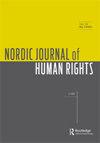遗产社区与人权:马里兰州卡托克廷熔炉的个案研究
IF 1.2
Q3 POLITICAL SCIENCE
引用次数: 0
摘要
Catoctin Furnace村位于美国马里兰州的乡村,这里有一座早期的铁炉遗址。到1776年开始运营,早期的劳动力几乎全部是被奴役的非洲人和非裔美国人。Catoctin Furnace Historical Society, Inc. (CFHS)是当地一家非营利组织,其中一位作者在该组织的董事会任职,该组织将寻找这些被奴役和被解放的黑人工人的后代社区作为主要重点,同时也保护欧洲劳工的遗产,并试图促进村里的经济和文化活动。到目前为止,还没有发现在卡托克廷熔炉被奴役的人的直系后裔,这意味着该遗址可以被认为是“孤儿遗产”。通过孤儿遗产和“实际亲属关系”的视角来看待该遗址,提供了另一种分析框架,可以有效地应用于其他遗址。这个案例研究帮助我们理解“基于权利的方法”的概念,以及场地管理者如何处理不同群体有时相互冲突的需求和愿望,同时平衡他们各自对遗产和其他人权的权利,以及在民主化访问中使用艺术解释模式。本文章由计算机程序翻译,如有差异,请以英文原文为准。
Heritage Communities and Human Rights: A Case Study from Catoctin Furnace, Maryland
ABSTRACT The village of Catoctin Furnace, located in rural Maryland, in the United States, houses an early iron furnace site. Operational by 1776, its workforce in the early years was almost entirely enslaved African and African American people. A local non-profit, the Catoctin Furnace Historical Society, Inc. (CFHS), on the board of which one of the authors serves, has made the search for a descendant community of these enslaved and freed Black workers a principal focus, while also preserving the heritage of European labourers and trying to foster economic and cultural activity in the village. So far, no living, direct descendant of a person who was enslaved at Catoctin Furnace has been identified, meaning the site can be considered ‘orphan heritage’. Looking at the site through the lenses of orphan heritage and ‘fictive kinship’ provides an alternative analytical framework which may be usefully applied at other sites. This case study helps us understand the notion of ‘rights-based approaches’ and how site managers can handle the sometimes clashing needs and desires of different groups while balancing their respective rights to heritage and to other human rights, as well as the use of artistic modes of interpretation in democratising access to the past.
求助全文
通过发布文献求助,成功后即可免费获取论文全文。
去求助
来源期刊

Nordic Journal of Human Rights
POLITICAL SCIENCE-
CiteScore
1.00
自引率
25.00%
发文量
29
期刊介绍:
The Nordic Journal of Human Rights is the Nordic countries’ leading forum for analyses, debate and information about human rights. The Journal’s aim is to provide a cutting-edge forum for international academic critique and analysis in the field of human rights. The Journal takes a broad view of human rights, and wishes to publish high quality and cross-disciplinary analyses and comments on the past, current and future status of human rights for profound collective reflection. It was first issued in 1982 and is published by the Norwegian Centre for Human Rights at the University of Oslo in collaboration with Nordic research centres for human rights.
 求助内容:
求助内容: 应助结果提醒方式:
应助结果提醒方式:


